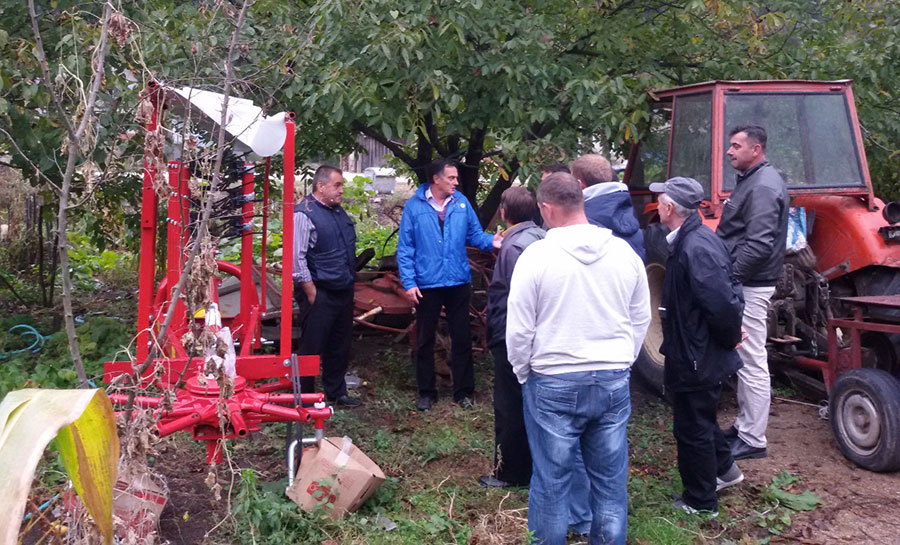Adaptation to climate change is the subject of a series of training sessions launched here today – for small-scale agricultural producers, agricultural extension services and local governments. The training is organized and conducted by FAO in cooperation with the European Union, the Ministry of Agriculture and Environmental Protection (MAEP) and local self-governments. Sessions will be held in seven Eastern Serbia municipalities from now through March 2017, with an estimated 800 farmers and 30 extension service employees participating.
Agricultural producers in Serbia have been affected by the extreme weather events in recent months and years – most seriously by the catastrophic May 2014 floods, and again by floods in March this year.
Disaster Risk Reduction and Climate Change Adaptation in Agriculture is a programme launched earlier this year by FAO, as a logical continuation of its efforts to educate and support learning in agriculture. Trainings held at the beginning of the year were organized for government and local self-government officials, while current trainings are organized for small-scale farmers. In addition to the climate change topic, training will cover resilience building, Climate-smart agriculture, disaster risk reduction and management, new technologies in agricultural production, and efficient farm management.
Training aim to increase resilience of small agricultural producers and contribute to the reduction of potential disaster risks, like droughts, floods and pests diseases in following period. Also, trainings aim to present the farmers ways in which they can improve their production in accordance with the principles of climate-smart agriculture. This main goal will be achieved by presenting to the participants possible climate change adaptation measures in agricultural, with focus on technologies and production techniques. With this practical knowledge to new agro technical measures and best practices managing their farms, small agricultural producers will be able to better adapt to the changing environment and become more resilient to climate changes and extreme events.
Trainings are sector oriented and designed for six groups of small agriculture producers, based on their prevalent farming practices and interest: field crops, Fruits and berries, Livestock production, Vegetable production, Agricultural mechanization and Farm management. One day trainings in each of the six topics will be held in each of seven municipalities affected by the 2014 floods in the following municipalities of Eastern Serbia: Boljevac, Knjaževac, Negotin, Zaječar, Kladovo, Majdanpek and Svrljig. Main target group and participants are small agriculture producers, young farmers, women farmers and representatives of minorities, while municipal representatives, representatives of regional extension and advisory offices, veterinarians, representatives of agriculture associations and cooperatives will also attend trainings.
Trainings will be completely adapted to target groups and will include mixture of lectures, simple exercises and demonstrations. Most of innovations will be presented through examples of good practices around the world. Important part of the training is to increase awareness on climate changes effects through discussions based personal experiences. Mixture of lectures, exercises and discussions should lead to understanding that changes are necessary and possible.
FAO workshops are another step in implementation of the EU programme of support to agriculture in Serbia within the „EU assistance for Flood Relief in Serbia“ programme. To date, the EU has allocated 9,5 million euros to support vulnerable agricultural households that suffered damage in the 2014 floods. More than 34,000 farmers have received agricultural support packages (seeds, fertilizer, animal feed, greenhouses, seedlings). The programme of assistance is implemented in cooperation with Ministry of Agriculture and Environmental Protection, Public Investment Management Office and local self governments.
European Union assistance to flood relief in Serbia program, worth 92 million euros, is funded by the European Union under the pre-accession funds IPA 2012 and IPA 2014. The funds will be used for construction of new houses, rehabilitation of public buildings and infrastructure, private houses and roads and recovery of economy and agriculture in municipalities most affected with floods. All activities in the field are implemented by the United Nations Office for Project Services (UNOPS), Food and Agriculture Organization of the United Nations (FAO), organisations HELP and ABS and Danish Refugee Council (DRC), Austrian Development Agency (ADA) and World Bank – in coordination with Government of Serbia Public Investment Management Office.




